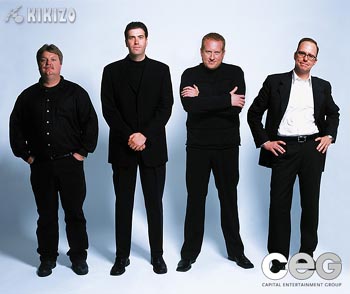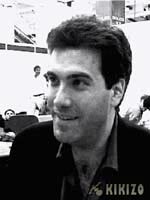An Interview with Kevin Bachus
One of the four visionaries behind what we now know as Xbox, Kevin Bachus' new company aims to set new standards in the games business. Read our in-depth interview for a fascinating look into the industry, and see what's on the horizon.
We recently had the opportunity to meet with Kevin Bachus, one of the four men behind the concept and launch of Xbox, who left Microsoft in 2001 to start Capital Entertainment Group. Having spoken to analysts about the CEG venture, we wanted to learn more.
Kevin granted an extensive interview, in which we find out about their partners including Sega, the exciting ways CEG is working in the industry, and what it means for us as gamers.
 CEG's ambitions plans could dramatically imporve the
CEG's ambitions plans could dramatically imporve thenumber of original, innovative titles on the shelves.
Kikizo: Could you start off by telling us about your time at Microsoft on the Xbox team, and how these experiences have led you in this new direction?
Before I joined Microsoft, I'd been working at a software publisher called Mindscape, working with a lot of European developers that the company employed and worked with externally. We did a lot of videogames for Windows, and because of that I had a lot of interaction with Microsoft, and ultimately over time it made sense to take an opportunity that was presented to me to go work for Microsoft.
I joined Microsoft back in 1997 as the Group product Manager for DirectX, the technology that allows you to make games for Windows, so I had a lot of interaction with games developers, game publishers, game journalists, and out of that initiative came the opportunity to work with my partners, Seamus Blackley, Ted Hase and Otto Berkes, to produce the concept that eventually became Xbox.
I stayed at Microsoft for a couple of years after that, to get Xbox off the ground. I was the first Director of Thirdparty Relations, for attracting publishers and developers to the make games for the platform. I stayed until the E3 of 2001, when we really started to show a lot of thirdparty games. Then I left to form Capital Entertainment Group, which is our new company.
Kikizo: After Microsoft, what compelled you to start this new business?
 |
"When you are producing a game, problems can arise from the way they are funded." |
There's a lot of creativity in developers and in publishers that's really not able to be used, because games are just so expensive and difficult to produce. So we left Microsoft to create Capital Entertainment Group, as way to address those issues, and to provide another source of production expertise and funding that would allow really creative, innovative games to come to market.
Kikizo: So tell us about how Capital Entertainment Group itself actually got started.
It was actually started by four people: myself, our CEO Gene Mauro, Mark Hood, and Seamus Blackley. You know Seamus, and I've said a bit about myself... Mark Hood was most recently General Manager at Sierra Studios. He spent fourteen years at Sierra Online, and he's one of the most creative production executives in the industry. Mark has a real background for producing and managing the production of games, and he's really seen and been involved in every type of production you can imagine - starting fourteen years ago at Sierra Online, when it was just Ken and Roberta Williams, and just a few people with a lot of great ideas for adventure games.
Gene was one of the first developer talent agents, so he actually went and represented developers to secure production deals with publishers - to try and get funding and to get their ideas places. Gene and I were pursuing similar paths, trying to figure out from a production standpoint how to take advantage of this opportunity, but yet addressing some of the challenges of getting the games funded, especially some of the riskier, more innovative games. Gene, from the perspective of a developer agent representing developers, was finding the frustration of trying to get the more creative games placed with publishers. So he went out after E3 of 2001, to try and put together this company and raise money for it. We were introduced by a mutual friend. He said, "you guys keep talking about the same sorts of things - you should hook up." He'd already met and was working with Mark, and it was only natural that Seamus should come on board as well. So the four of us really put together the concept of the company as it stands today.
Kikizo: So now that it's up and running, how does CEG work? What problems is it really out to address and how successful can it be?
Capital Entertainment Group is the industry's first independent production company. So, like a film production company such as Miramax, Castlerock or Imagine Entertainment, we go out and find intellectual properties - in our case, games. And then we produce those games - we work just as any publisher would to provide management to the development teams, to provide the help and creative support, the structure and discipline that enable great games to come to life. If you think about it, every game that's been successful has existed in a kind of safe creative bubble, that's allowed the game to come to market. There was just a great convergence of talented people, with enough money and enough time, and bright ideas, to be able to change the world, as we know it, as gamers.
 |
"When you look at a game concept on paper, it's very difficult to make a decision to put $10m-$15m into it." |
Kikizo: To address your last statement there, you mention that publishers often find only certain kinds of games commercially viable, even though gamers may be asking for something else or something new. How much of a challenge is it to try and change this, and what gives you the know-how to do it where others have failed?
Everybody in the industry wants to try and make great games - gamers want great games, developers and publishers want to provide them. There's no shortage of desire to do that. But when you're looking at a concept on a piece of paper, with very little to go on, and trying to decide whether to do it, it's very difficult to make a decision to put $10m-$15m into the development and the marketing of that game. It's a very risky business for the publisher, who at end of the day is on the hook for the entire financial decision. If the game is a flop, it's really only the publisher that loses their shirt. The developer is compensated - they may not actually see profit, but at least they made their money back.
And today, when many publishers are large, publicly traded companies, investors are looking for very strong returns, year on year and every quarter. It's very difficult for them to take those big bets and those big risks. So as a result what you see today, like you saw in the film industry 25-30 years ago when costs started to rise, are publishers being very, very conservative. They rely on formulas, sequels and licenses. Which is fine, but it doesn't allow them to take the big bets, and that's something that frustrates the publishers as much as the developers. I can't tell you how many times a publisher has said to me, "every day we have concepts come across our desk that we think are a great idea, but just there's no way that we can convince the marketing and sales people that it's something to put money behind". So if there's just some way for developers to go off and spend six months bringing that product to a later stage, so that they can actually see it, then that would be tremendous. To some extent, Capital Entertainment Group provides them that opportunity.





 Satoru Iwata Video Interview - the late Nintendo president spoke with Kikizo in 2004 as 'Nintendo Revolution' loomed.
Satoru Iwata Video Interview - the late Nintendo president spoke with Kikizo in 2004 as 'Nintendo Revolution' loomed. Kaz Hirai Video Interview - the first of Kikizo's interviews with the man who went on to become global head of Sony.
Kaz Hirai Video Interview - the first of Kikizo's interviews with the man who went on to become global head of Sony. Ed Fries Video Interview - one of Xbox's founders discusses an epic journey from Excel to Xbox.
Ed Fries Video Interview - one of Xbox's founders discusses an epic journey from Excel to Xbox. Yu Suzuki, the Kikizo Interview - we spend time with one of gaming's most revered creators.
Yu Suzuki, the Kikizo Interview - we spend time with one of gaming's most revered creators. Tetris - The Making of an Icon: Alexey Pajitnov and Henk Rogers reveal the fascinating story behind Tetris
Tetris - The Making of an Icon: Alexey Pajitnov and Henk Rogers reveal the fascinating story behind Tetris Rare founders, Chris and Tim Stamper - their only interview? Genuinely 'rare' sit down with founders of the legendary studio.
Rare founders, Chris and Tim Stamper - their only interview? Genuinely 'rare' sit down with founders of the legendary studio. The History of First-Person Shooters - a retrospective, from Maze War to Modern Warfare
The History of First-Person Shooters - a retrospective, from Maze War to Modern Warfare